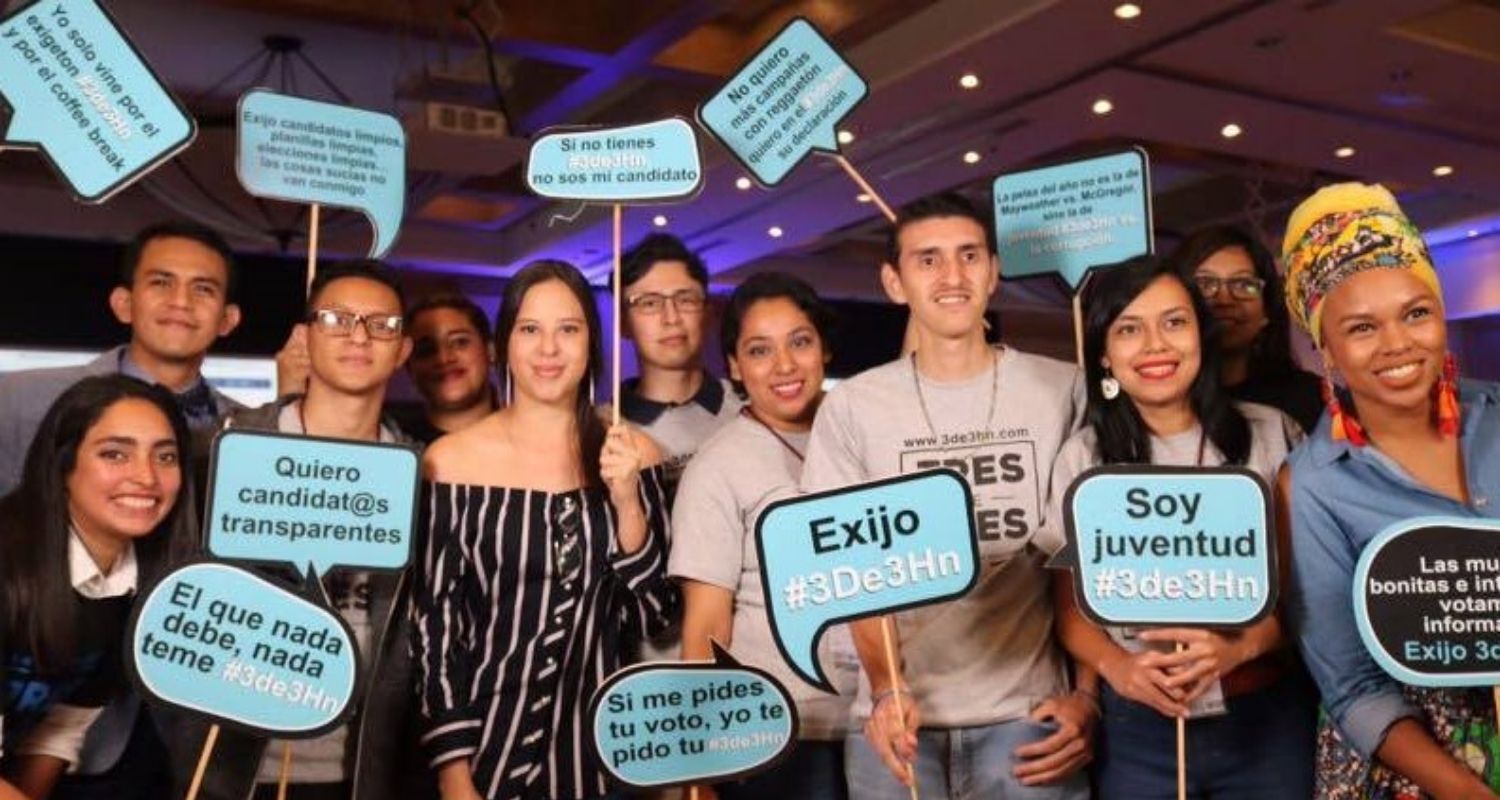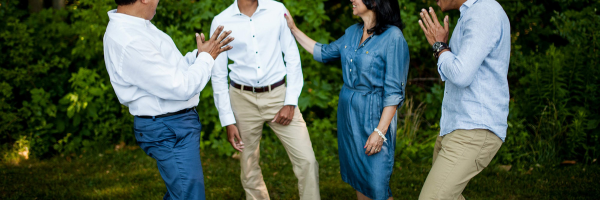September 18, 2017
If the playbook for Honduran political campaigns is changing, the younger generation is a big part of the explanation.
Hondurans under the age of 30 are increasingly educated, connected, and unimpressed by the party politics of the Central American country’s checkered past. They’re less likely to be swayed by catchy campaign jingles or the promise of a few dollars or a bag of food supplies before Election Day.
“We know what we want,” said Jorge Aroca, leader of Buenas Acciones Honduras, a local youth organization, “We want politicians to work with us and not just disappoint us.”
Young Hondurans – Victims and Protagonists
Young people have the potential to dramatically shift the politics of the country. A quarter of Honduras’ population is between the ages of 18 and 30, and the demographic makes up 43% of the electorate.
This same demographic also suffers most from social problems like unemployment, violence, and limited opportunities. Only 4% of Honduras’ young people will graduate from universities, and 60% of adults under the age of 30 are left out of the formal labor market. Young people are also most likely to be victims of violence – 35% of homicide victims in Honduras are between the ages of 20 and 30. Young Honduran men are more likely to die by murder than by suicide, traffic accident, or the ingestion of poison – the three leading causes of death in the United States.
In the midst of these serious social problems, the majority of young Hondurans find themselves disillusioned with politics and government. Over 93% perceive a “great deal of corruption” in the country, and 71% report no interest in participating in politics.
This is in part because, “We have we have been taught and modeled a profile of politicians who are not interested in actually changing our reality,” said Magdalena Dolmo, a teacher.
Her demands are different: “We are asking for results,” she says, “We young people should take on responsibility and become agents of change.”
Dolmo, Aroca, and other young leaders representing more than 20 different organizations are coming together to demand transparency from candidates in Honduras’ November general elections. Through an initiative led by the Association for a More Just Society called “3de3Hn”, they hope to make their voices heard and see their demands answered.
“We Hondurans are fed up with corruption. But to ask politicians to resolve the problem is like asking a football player to be the referee of his own team,” says the 3de3Hn promotional video, “The solution has to come from us.”
Transparency in Elections for Public Office
The initiative “3de3Hn”, or “3 out of 3” began in Mexico, with similar programs launched in countries including Peru, Argentina, and Chile.
The initiative centers around an online portal that asks political candidates to disclose three important documents, with the purpose of allowing citizens to make an informed decision about which candidate deserves their vote. The three documents, summarized on the 3de3hn website, are as follows:
- Statement of Assets – how much do the candidates have?
- Conflict of Interest Statement – where have the candidates worked, and with whom? Who are their friends? To whom do they owe money?
- Tax Return – “To ensure they don’t just spend our taxes, but also contribute to paying them”
“We want young people to really know how these candidates are being financed, what interests they might have in the private sector, or even interests with organized crime, and also whether they have paid their taxes,” said Lester Ramírez, director of investigations for the Association for a More Just Society.
“We want our representatives for public office to have the highest morals and transparency to comply with the law,” said Ramírez.
The 3de3Hn website provides a portal for politicians to upload their three statements, in addition to their CVs, government proposals, and links to their website and social media accounts. Citizens can search the names of all candidates for public office, accessing the information of those who have uploaded their “3de3”, and using the database to demand information from candidates who have not yet disclosed. The website generates short messages for social media, tagging candidates and political parties with the hashtag #3de3hn.
The use of social media in Honduras has been growing rapidly. Despite high levels of poverty in the country, over 3 million Hondurans have access to internet, and nearly all of these internet users regularly access social media sites like Facebook. Coordinators of 3de3 hope to harness social media to spread their message – “You can do more than just make funny memes,” they tell young people, encouraging them to use their networks to call out leaders and advocate for transparency.
“As citizens, we have the right to access the information of our candidates, and candidates have the moral obligation to disclose it,” said Denise Zelaya, sub-coordinator of investigations for the Association for a More Just Society (ASJ, formerly known as AJS), and one of the leaders behind the 3de3 movement, “It is crucial for citizens to be empowered and to actively demand candidates’ transparency.”
Merit-Based Elections
“In November, we are not only voting, we are choosing the leaders that will determine the country’s future,” said Zelaya.
One cultural shift that 3de3 coordinators hope to see is an increase in informed votes that prioritize qualified political candidates, evaluating their fitness for public office in the way businesses make hiring decisions for any other job.
“In Honduras in the 21st century, it’s no longer about just asking for the vote, it’s about the candidates demonstrating who they are, and what they have done to deserve this public position, who finances them, and what they intend to do with the power that we as citizens are delegating to them,” said Ramirez.
For many young people, this mindset means a break from family party loyalty that may go back decades.
“I will not as a citizen give my vote to someone I do not know, someone who is requesting my vote just because there is a family tradition of supporting that party,” said Naama López, a lawyer and investigator for ASJ, as well as an advocate for the Afro-Caribbean Garífuna people group.
“We have to demand more – we are citizens and also shareholders of the state,” said López.
López and colleagues Denise Zelaya and Melissa Eguigure are the driving force behind 3de3 at ASJ, coordinating events to teach both politicians and citizens, especially young people, about the initiative and invite them to participate. For them, the topic of youth participation is personal – all three are 26 years old.
López, Zelaya, and Eguigure represent a group of educated, professional young people who not only can clearly identify ways that corruption and government mismanagement has hurt them and their communities, but also specific measures they want the government to take to promote change.
“Youth is a synonym for strength, vitality, and innovation. To be part of 3de3Hn is to seek to have a positive impact in Honduran society, collaborating to create transparent policies,” said Eguigure.
The 3de3 initiative has generated substantial press attention, and leaders have held meetings to present the platform to all 10 political parties, including dozens of mayoral and Congressional candidates and all but one presidential candidate.
The coalition plans to keep on working to get the message out, visiting different cities across the country to involve more citizens, especially young people, and show politicians that there are people who value transparency and accountability.
It’s a message they hope will last up to and even beyond the November elections.
“This electoral process does not end in November,” said López. “This is the beginning of the electoral process – after this, we will see politicians carrying out positions that we decided to place them in. For us as young people, it’s important that we advocate beforehand, but also after these candidates are placed in their positions.”
To learn more about the platform, visit www.3de3hn.com.



















